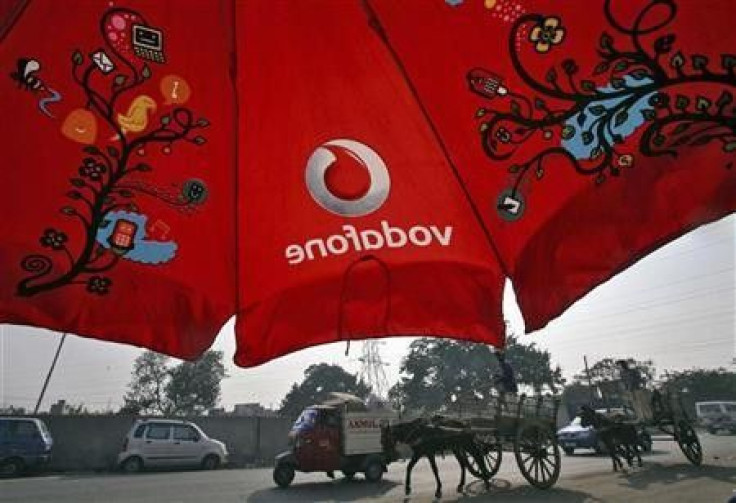Vodafone Wins India Tax Battle, Shares Rise

(REUTERS) -- Vodafone Group Plc won a $2.2 billion legal battle against India's tax office in a Supreme Court ruling that analysts said would encourage foreign investment and clear the way for the company's planned initial public offering in India.
India's reputation as an investment destination has taken a hit over the past year as the economy slowed, government reforms stalled and corruption scandals - notably in the telecoms industry - heightened concerns about government policies.
All this talk about uncertainty for foreign investment, well, I hope for one area, this judgment clears the air, Harish Salve, one of India's top lawyers who argued for Vodafone in the case, said after the verdict was announced on Friday.
The tax demand was over Vodafone's $11 billion deal to buy Hutchison Whampoa Ltd's Indian mobile business in 2007. The UK-based company had appealed to the Supreme Court after losing the case in the Bombay High Court in 2010.
The verdict, which sent Vodafone shares up as much as 2.5 percent in London, was a rare piece of positive news for foreign investors in India over the past few months.
Just last month, plans to open up the country's $450 billion retail sector to global supermarket operators were derailed by political opposition.
Investment proposals in India plunged 45 percent to a five-year low in 2011 as companies halted projects, many citing red tape and administrative gridlock, according to the Centre for Monitoring Indian Economy.
I think it's a good decision, said Pranav Sayta, a tax partner, Ernst & Young. It will help investments into India. It's definitely good for the industry. The confidence level on the Indian judicial process should certainly go up now.
CAPITAL PUNISHMENT
The demand for $2.2 billion in capital gains tax would amount to imposing capital punishment for capital investment since it lacks authority of law..., K.S. Radhakrishnan, one of the three judges ruling on the case, said in his order.
The court ordered the tax office to refund to Vodafone with 4 percent interest the 25 billion rupees ($496 million) it had been asked to deposit pending a ruling.
Vodafone, the world's largest mobile operator by revenue, had argued that Indian tax authorities had no right to tax the transaction between two foreign entities.
Even if tax was due, the company had argued, it should be paid by the seller not the buyer.
Indian authorities had said the deal was liable for tax because most of the assets were in India and because under local tax law, buyers have to withhold capital gains tax liabilities and pay them to the government.
Indian Finance Minister Pranab Mukherjee told reporters he would study the court's judgment. He did not elaborate.
CUT-THROAT COMPETITION
Vodafone is the largest overseas corporate investor in India but has come to symbolize the perils foreign firms face doing business in the country.
The company has made India the centerpiece of its fast-growing emerging markets portfolio, designed to balance out slowing growth in more mature European territories.
But while it became India's third-largest mobile carrier by subscribers, Vodafone took an impairment charge of $3.56 billion on its Indian operations in 2010 due to cut-throat competition and skyrocketing spectrum costs.
Vodafone agreed to buy out Indian partner Essar Group for $5 billion last year, putting an end to their highly fractious relationship that had spilled over into the open.
We are a committed long-term investor in India, Vodafone Chief Executive Vittorio Colao said in a statement after the court verdict. We will continue to grow our Indian business -- including making significant investments in rural areas and in 3G network coverage, he said.
With more than 880 million mobile subscribers, India is the world's second-biggest telecoms market after China. Vodafone has about 148 million users in the country, making up a considerable chunk of its 400 million subscribers worldwide.
The once-booming market has struggled in recent years, however, as 15 companies engaged in fierce competition.
A massive telecoms licensing scandal that came to light in late 2010 has also dampened investor enthusiasm.
Vodafone has said it has plans to launch an initial public offering of shares in its Indian business but has not set a timeframe.
Robin Bienenstock, an analyst at Bernstein Research in London, said she expected Vodafone to announce an IPO for 30 percent of the Indian business later this year that could raise 3.4 billion pounds ($5.26 billion).
The resolution ... will reassure investors, the majority of whom we think had resigned themselves to Vodafone being required to pay, and also to those who suspected that the final liability may have been greater than the original demand, Bienenstock said in a note.
Friday's ruling will also be welcomed by other multi-national companies that could potentially face tax issues in India over cross-border deals.
Last year, India's finance ministry said it was looking into whether Kraft Foods would have to pay taxes to Indian authorities in its $19 billion takeover of Cadbury in 2010.
Global brewer SABMiller and AT&T Inc are also involved in tax disputes in India, media reports have said.
($1 = 0.6464 British pounds = 50.32 Indian rupees)
© Copyright Thomson Reuters 2024. All rights reserved.











